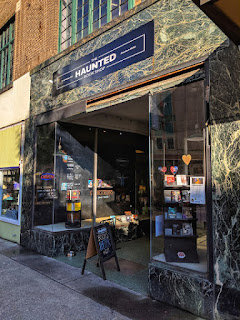cj Sez: An excerpt from
my archives: What was the first thing you wrote? A poem? A memoir? A little
piece of fiction? Journaling in a diary? If you’re like me, you kept it and
every once in a while, you resurrect it and wonder, “What was I thinking?” Or,
and I applaud you if true, you think, “Did I really write this? It’s actually
pretty good.”
James Patterson once
said that his first novel was rejected thirty-one times before it was
published. Even after publication, it didn’t “do all that well.”* Failure
didn’t discourage him; it encouraged him. He wanted to write.
(* Not sure what he
meant by that because when first published in 1976, THE THOMAS BERRYMAN
NUMBER earned him the Edgar Award for “Best First Novel By An American Author.”
He must have been referring to lower sales numbers.)
So, where did his
worldwide success come from, besides having a natural talent telling stories? He
studied and analyzed the genre he wanted to write. Like many authors (I think
the generalization is true), he started out writing part-time because he had a day
job. Today, his books have sold more than 300 million copies worldwide.
From bios I’ve read,
many, if not all, successful writers have some fear of failure, especially at
the beginning of their careers. They have an idea they get excited to write
about. The words flow from their minds and fingers like magic, but the farther
they get into the story, the more they may second-guess their abilities. Doubts
creep in: Someone’s already told this
story, better. No one is going to read this drivel. It’ll never sell. (Sounds like me)
King on writing
In his 2001 memoir, On
Writing, Stephen King writes: “I had been playing with the
idea of writing a
little book about writing
for a year or more ///but had held back because I
didn’t trust my own motivations—why did I want to write about writing? What
made me think I had anything worth saying? The easy answer is that someone who
has sold as many books of fiction as I have must have something worthwhile to
say about writing it, but the easy answer isn’t always the truth.”
(p.s. The
book was reissued in 2012 and again in 2020.)
Those possibilities
exist for all authors, even Patterson and King, and every so often they do have
a book that doesn’t “do all that well.” Fortunately for their millions of fans,
they continue to write wonderful stories.
Like Patterson and
King, to reduce the chances of failure, writers who aspire to become published
authors must take the time to study the craft. Participate in workshops,
conferences, writers’ groups, read-read-read, and get their manuscripts professionally
edited before being published.
I suggest that you write
for yourself first. When you’re the only one you have to please, it reduces the
stress of arranging coherent sentences into a story arc on a blank page. Write
something then put it away for a few weeks or months before reading it again.
You’ll be surprised at what you find.
§§
Etcetera and P.S.A.
Calling all mystery, suspense, thriller, and crime writers.
Sisters-in-Crime is an international organization of several hundred authors ready
and willing to encourage and applaud your work. And they do not hesitate to
share their expertise. The next time you’re on Facebook, drop by their page and
see what’s happening.
March 2022 Hallmark Publishing Open Submissions
§§
Reading Suggestions:
Still sale priced at
$1.99 at the time of this post, this Fat Tuesday anthology is chock full of
short stories that are entertaining to read all year long:
LAISSEZ LES BONS TEMPS ROULER
§§
That’s it for
today’s post. You-all guys keep on keeping on, and I’ll try to do the same.
cj
P.S. The Haunted
Bookshop has signed paperback copies of my books in stock. TO ORDER my author-graphed
books or any book of your choice on-line from a favorite, indie bookstore,
contact The Haunted Bookshop here: https://www.thehauntedbookshopmobile.com/contact-us
➜ Follow me . . .










